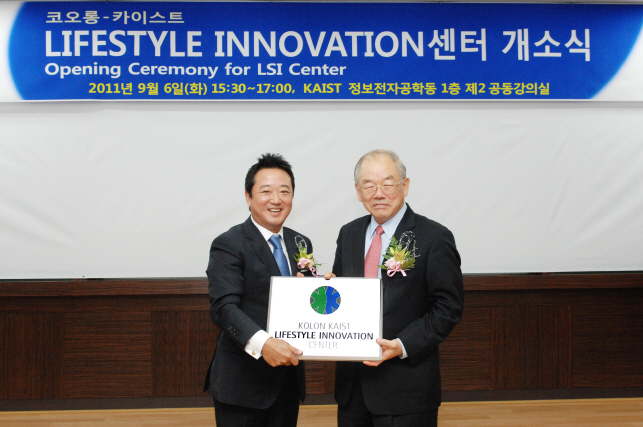policy
KAIST and KOLON opened the “Lifestyle Innovation Center” on the 6th of September this year. The ceremony was held at KAIST where the MOU for developing new industries was also signed.
The opening ceremony was attended by Chairman of KOLON Lee Eung Yeul and CEO’s of other various affiliate companies like Kim Nam Soo, Bae Young Ho, Park Dong Moon, and etc. and also President of KAIST Seo Nam Pyo along with professors who will participate like Professor Lee Young Hoon, Professor Joo Dae Joon, Professor Bae Kyung Wook, and Vice President of KAIST Jo Dong Ho.
The KOLON-KAIST Lifestyle Innovation Center (referred to as KOLON LSI Center) was developed under instructions from Chairman of KOLON Lee Eung Yeul wishing for the active cooperation and transfers of technologies with KAIST and, as a result, creating a domestic technology transfer network. The two institutes will be working together in finding highly promising fields of industry (with high risk but also high return) through research and development, technological advices, competitive exhibitions, and workshops.
Chairman of KOLON Lee Eung Yeul stated that “it is imperative to increase the success rate of new business and shorten the time frame of starting a new business by encouraging the business community to launch startups more and for the executive community including policy makers to support such endeavors” and that “the KOLON LSI Center will create a positive synergy to that end.”
President Seo Nam Pyo commented that, “KOLON-KAIST LSI Center is different even at the conceptual level” and that “I am confident that it will be a great success as it is the first of specialized joint labs in Korea that encourages professors and researchers of companies to conduct joint research programs.”
LSI Center was founded and will be administered by the Collective Contribution from KOLON, KOLON Industry, and KOLON GloTech, investing 7.5billion Korean Won over the course of 5 years.

-
research RAIBO Runs over Walls with Feline Agility... Ready for Effortless Search over Mountaineous and Rough Terrains
< Photo 1. Research Team Photo (Professor Jemin Hwangbo, second from right in the front row) > KAIST's quadrupedal robot, RAIBO, can now move at high speed across discontinuous and complex terrains such as stairs, gaps, walls, and debris. It has demonstrated its ability to run on vertical walls, leap over 1.3-meter-wide gaps, sprint at approximately 14.4 km/h over stepping stones, and move quickly and nimbly on terrain combining 30° slopes, stairs, and stepping stones. RAIBO is ex
2025-06-04 -
research Professor Hyun Myung's Team Wins First Place in a Challenge at ICRA by IEEE
< Photo 1. (From left) Daebeom Kim (Team Leader, Ph.D. student), Seungjae Lee (Ph.D. student), Seoyeon Jang (Ph.D. student), Jei Kong (Master's student), Professor Hyun Myung > A team of the Urban Robotics Lab, led by Professor Hyun Myung from the KAIST School of Electrical Engineering, achieved a remarkable first-place overall victory in the Nothing Stands Still Challenge (NSS Challenge) 2025, held at the 2025 IEEE International Conference on Robotics and Automation (ICRA), the world
2025-05-30 -
event Formosa Group of Taiwan to Establish Bio R&D Center at KAIST Investing 12.5 M USD
KAIST (President Kwang-Hyung Lee) announced on February 17th that it signed an agreement for cooperation in the bio-medical field with Formosa Group, one of the three largest companies in Taiwan. < Formosa Group Chairman Sandy Wang and KAIST President Kwang-Hyung Lee at the signing ceremony > Formosa Group Executive Committee member and Chairman Sandy Wang, who leads the group's bio and eco-friendly energy sectors, decided to establish a bio-medical research center within KAIST and i
2025-02-17 -
research KAIST develops ‘Hoverbike’ to roam the future skies
< Photo 1. A group photo of the research team > Hoverbike is a kind of next-generation mobility that can complement the existing transportation system and can be used as an air transportation means without traffic congestion through high-weight payloads and long-distance flights. It is expected that domestic researchers will contribute to the development of the domestic PAV* and UAM markets by developing a domestically developed manned/unmanned hybrid aircraft that escapes dependence
2024-12-27 -
event KAIST’s RAIBO2 becomes the World’s First Robo-dog to Successfully Complete a Full-course Marathon
KAIST's quadrupedal walking robot "RAIBO", which can run seamlessly on sandy beaches, has now evolved into "RAIBO2"and achieved the groundbreaking milestone by becomeing the world's first quadrupedal robot to successfully complete a full-course marathon in an official event. < Photo 1. A group photo of RAIBO2 and the team after completing the full-course marathon > KAIST (President Kwang Hyung Lee) announced on the 17th of November that Professor Je Min Hwangbo's research team of t
2024-11-17